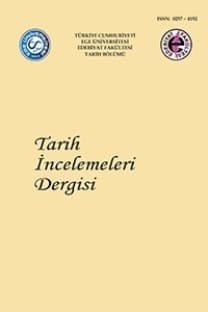HİTİTÇE ÇİVİYAZILI METİNLERDE GEÇEN KUMARBİ EFSANESİ VE ULLİKUMMİ ŞARKISI'NA İLİŞKİN BİR TARTIŞMA NOTU
Özet Kumarbi Efsanesi ile bu efsanenin devamı niteliğindeki Ullikummi Şarkısı, Hurri/Hitit edebiyatının en önemli örnekleri arasındadır. Bu efsaneler bir silsile halinde devam eden ve tanrısal iktidarları konu alan kurgusu ile dikkat çekicidir. Bu kurgu, efsanenin kabul görmüş olduğu coğrafyadaki halkın zirai faaliyetleri ile ilişkili izler taşıyor olabilir. Tanrılar, yılın belli dönemlerinin, özellikle de tarım ile şekillenmiş olan mevsimsel döngülerin kişileştirilmiş halleri olabilir mi?
Abstract A Discussion Note About The Kumarbi Myth and The Song of Ullikummi Mentioned in Hittite Cuneiform Texts
Kumarbi Epic and Song of Ullikummi on continuation of Kumarbi Epic are most important examples in Hurrian/Hittite literature. This myths is remarkable for its fiction have in a range of on going divine power. This fiction can be indicate agricultural behaivor of people that lived in the region accepted the myth. Can be gods personified some periods of theye are specially seasonal cycle identified by agricultural practice?
___
- Archi 2009 Bacharova 2012 Cohen 1993 Giorgieri 2001 Goetze 1950 Goetze 1957 Grayson 1970 Gurney 1952 Güterbock 1945 Güterbock 1946 Güterbock 1951 Güterbock 1997 Haas 1994 Haas 1995 Haas 2006 Hoffner 1974 A. Archi, "Orality, Direct Speech and the Kumarbi Cycle", Altorientalische Forschungen, 36/2, s.209-229. M. R. Bacharova, "From Kingship of Heaven to King List: Syro-Anatolien Courts and the History of the Worlds", Journal Ancient of Near Eastern Religious, Vol. 12, s.97-118. M. E. Cohen, The Cultic Calendars of the Ancient Near East, CDL Press, Maryland. M. Giorgieri, "Die hurritische Fassung des Ullikummi-Lieds und ihre hethitische Parallele", 4. Hittitology Congress, s.134- 155. A. Goetze, "Hittite Myths, Epics and Legends", Ancient Near Eastern Texts Relating to the Old Testament, Princeton University Press, s. 120-128. A. Goetze, Kleinasien, Kulturgeschichte Des Alten Orients, Handbuch der Altertumswissenschaft, München. A. K. Grayson, Chronicles and the Akitu Festival, Rencontre Assyriologique Internationale XVII, s.160-170. O. R. Gurney, The Hittites, Penguins Book, Melbourne, London, Baltimore. H. G. Güterbock, Kumarbi Efsanesi, (çev. Sedat Alp), Türk Tarih Kurumu Basımevi, Türk Tarih Kurumu Yayınları, VII. Seri, No. 11 Ankara. H. G. Güterbock, Kumarbi. Mythen vom churritischen Kronos Istanbuler Schriften 16. H. G. Güterbock, "The Song of Ullikummi Revised Text of the Hittite Version of a Hurrian Myth", Journal of Cuneiform Studies, vol. 5, no. 4, s.135-161. H. G. Güterbock, Hittite Mythology, Perspecitves on Hittite Civilization: Selected Writings of Hans Gustav Güterbock, The Oriental Institute of the University of Chicago Assyriological Studies, no. 26, s.49-63. V. Haas, "Geschichte der Hethitischen Religion", Handbuch der Orientalistik, Band 15, s.?. V. Haas, "Kalender und Notzeit mythen. Betrachtungen zum Mythen zyklus vom Gott Kumarbi", Atti del II congresso internazionale de hittitologia, s.183-190. V. Haas, Die Hethitische Literatur, Berlin, New York. H. A. Hoffner, Alimenta Hethaeorum, Food Production in Hittite Asia Minor, American Oriental Series, vol. 55,New Heaven, Connecticut. Hoffner 1990 Kloekhorst 2008 Langdon 1923 Laroche 1968 Macqueen 1952 Otten 1950 Rochberg 2000 Rutherford 1991 Sayılı 1966 Schneider 2003 Schwemer 2008 Singer 2002 Speiser 1955 H. A. Hoffner, Hittite Myths, Second Edition, Scholar Press, Atlanta, Georgia. A. Kloekhorst, Etymological Dictionary of the Hittite Inherited Lexicon, Leiden Indo-European Etymological Dictionary Series 5, Brill, Leiden, Boston. S. Langdon, The Babylonian Epic of Creation, Clarendon Press, Oxford. E. Laroche, Notes sur le Pantheon Hourrite de Ras Shamra, Journal of American Oriental Studies, vol. 88, No. 1, s.148- 150. J. G. Macqueen, "Hattian Mythology and Hittite Monachy", Anatolian Studies, Vol. 9, s.171-188. H. Otten, Mythen von Gotte Kumarbi: Neue fragmente, Deutsche Akademie der Wissenschaften zur Berlin. Institute für Orientforschung, Akademie-Verlag, Berlin. F. Rochberg, "Astronomy and Calendars in Ancient Mesopotamia", Civilizations of the Ancient Near East, vol. III, s.1925-1940. I. C. Rutherford, "The Song of the Sea (A AB.BA. SÌR): Thoughts on KUB 45.63", 4. Hittitology Congress, s. 598-609. A. Sayılı, Mısırlılarda ve Mezopotamyalılarda Matematik, Astronomi ve Tıp, Türk Tarih Kurumu Basımevi, Ankara. T. Schneider, "Texte über den syrischen Wettergott aus Agypten", Ugarit Forschungen 35, s.605-627. D. Schwemer, "The Storm-Gods of the Ancient Near East: Summary, Synthesis, Recent Studies, Part II, Journal of Ancient Near Eastern Studies, Vol. 8, s. 1-44. I. Singer, "The Cold Lake and its Great Rock", Sprache und Kultur 3, Fs. Giorgadze, s.128-132. E. A. Speiser, "The Creation Epic", Ancient Near Eastern Texts Relating to the Old Testament, Princeton University Press, s.60-72.
- ISSN: 0257-4152
- Başlangıç: 1983
- Yayıncı: Prof. Dr. Süleyman Özkan
Sayıdaki Diğer Makaleler
Üzümün Bağı Asmanın Kurdu: Osmanlı İmparatorluğu’nda Filoksera İle Mücadele
DİPLOMAT P. A. TOLSTOY’UN ELÇİLİĞİ VE OSMANLI’YA DAİR İZLENİMLERİ
Kudüs Mutasarrıfları (1841-1902)
BİZANS'TAKİ VARENGLERİN İSKANDİNAVYA'DAKİ DİNSEL FETHE ETKİLERİ
CTESIAS'IN ANLATIMLARINDA NİNUS (NEMRUT)
BİRİNCİ DÜNYA SAVAŞI'NDA OSMANLI HİLÂL-İ AHMER CEMİYETİ'NİN SANATSAL FAALİYETLERİ
İnsanların En Kibarlarından: Selçukluların Bağdad Şahnesi Bihrûz El-Hâdim
İNSANLARIN EN KİBARLARINDAN: SELÇUKLULARIN BAĞDAD ŞAHNESİ BİHRÛZ EL-HÂDİM
